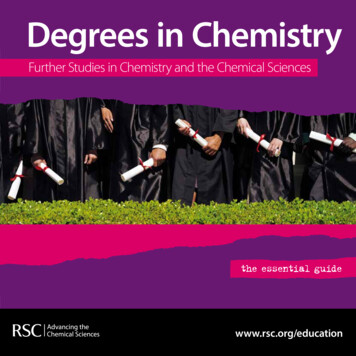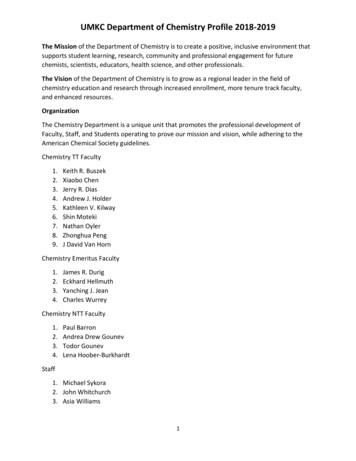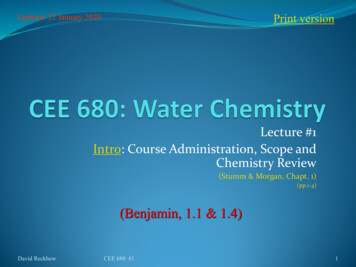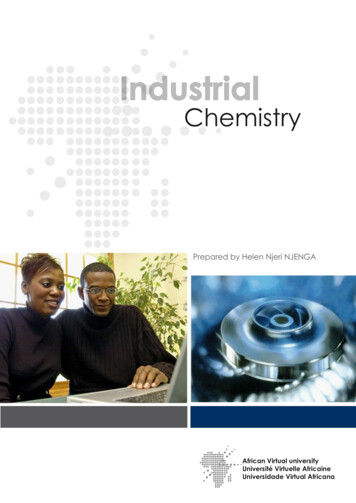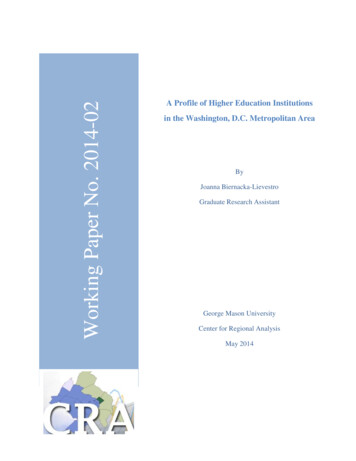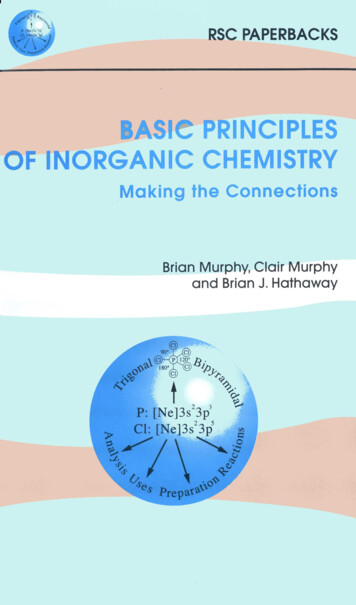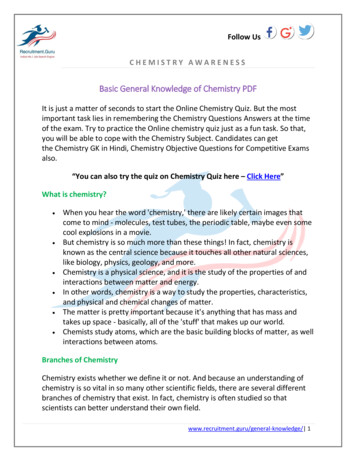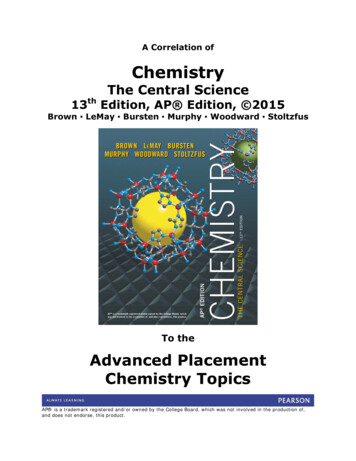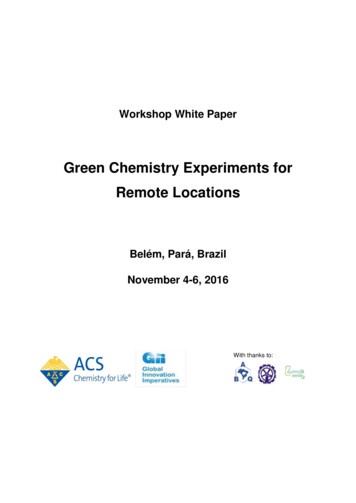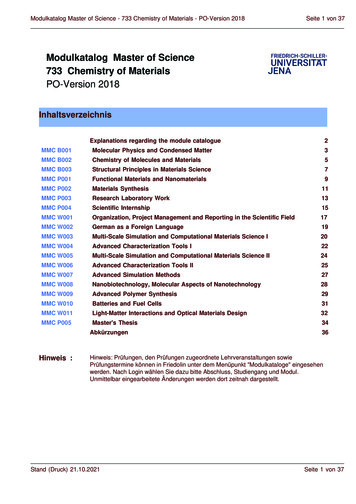
Transcription
Modulkatalog Master of Science - 733 Chemistry of Materials - PO-Version 2018Seite 1 von 37Modulkatalog Master of Science733 Chemistry of MaterialsPO-Version 2018InhaltsverzeichnisExplanations regarding the module catalogue2MMC B001Molecular Physics and Condensed Matter3MMC B002Chemistry of Molecules and Materials5MMC B003Structural Principles in Materials Science7MMC P001Functional Materials and Nanomaterials9MMC P002Materials Synthesis11MMC P003Research Laboratory Work13MMC P004Scientific Internship15MMC W001Organization, Project Management and Reporting in the Scientific Field17MMC W002German as a Foreign Language19MMC W003Multi-Scale Simulation and Computational Materials Science I20MMC W004Advanced Characterization Tools I22MMC W005Multi-Scale Simulation and Computational Materials Science II24MMC W006Advanced Characterization Tools II25MMC W007Advanced Simulation Methods27MMC W008Nanobiotechnology, Molecular Aspects of Nanotechnology28MMC W009Advanced Polymer Synthesis29MMC W010Batteries and Fuel Cells31MMC W011Light-Matter Interactions and Optical Materials Design32MMC P005Master's Thesis34AbkürzungenHinweis :36Hinweis: Prüfungen, den Prüfungen zugeordnete Lehrveranstaltungen sowiePrüfungstermine können in Friedolin unter dem Menüpunkt "Modulkataloge" eingesehenwerden. Nach Login wählen Sie dazu bitte Abschluss, Studiengang und Modul.Unmittelbar eingearbeitete Änderungen werden dort zeitnah dargestellt.Stand (Druck) 21.10.2021Seite 1 von 37
Seite 2 von 37Modulkatalog Master of Science - 733 Chemistry of Materials - PO-Version 2018Explanations regarding the module catalogueSeite 2 von 37Stand (Druck) 21.10.2021
Modulkatalog Master of Science - 733 Chemistry of Materials - PO-Version 2018Seite 3 von 37Modul MMC B001 Molecular Physics and Condensed MatterModulcodeMMC B001Modultitel (deutsch)Molecular Physics and Condensed MatterModultitel (englisch)Molecular Physics and Condensed MatterModul-Verantwortliche/rProf. Dr Volker Deckert, Prof. Dr Benjamin Dietzek, Prof. Dr AndreyTurchaninVoraussetzung für die Zulassungzum ModulnoneEmpfohlene bzw. erwarteteVorkenntnissenoneVerwendbarkeit (Voraussetzungwofür)Module required to complete master’s thesisArt des Moduls (Pflicht-, Wahlpflicht- Compulsory module (for students without Bachelor of Science inoder Wahlmodul)Physics)Häufigkeit des Angebots(Modulturnus)jedes 2. Semester (ab Wintersemester)Dauer des Moduls1 SemesterZusammensetzung des Moduls /Lehrformen (V, Ü, S, Praktikum, )Lecture (5 SWS), seminar (3 SWS)(SWS stands for‚ hours per week per semester)Leistungspunkte (ECTS credits)10 LPArbeitsaufwand (work load) in:- Präsenzstunden- Selbststudium(einschl. Prüfungsvorbereitungen)300 h120 h180 hInhalteThis adjustment module will present basic aspects of experimental solidstate and molecular physics in the context of chemistry of materials.Following the introduction of basic conservative equations, this includesconcepts of transport and structural dynamics (diffusion, chargeconductivity, thermal transport, phonon transport, Drude model, andplasmons). Based on this knowledge, in-depth considerations of theheat capacity of solids (e.g. Einstein model and Debye model) will bededucted. Knowledge of lattice vibrations will be extended towards thefundamental principles of vibrational spectroscopy. Finally, light-matterinteractions, including the concept of waves and a reconsideration ofgeometrical and wave optics, will be treated with a focus on the failureof the classic picture of matter (e.g. photoelectrical effect, Stern-Gerlachexperiment).Lern- und QualifikationszieleAcquiring basic concepts of (experimental) physics with respect to thephysical phenomena, and experimental concepts for studying moleculesand solids.Voraussetzung für die Zulassung zur noneModulprüfungStand (Druck) 21.10.2021Seite 3 von 37
Seite 4 von 37Modulkatalog Master of Science - 733 Chemistry of Materials - PO-Version 2018Voraussetzung für die Vergabe vonLeistungspunkten (Prüfungsform)Written or oral exam on the contents dealt with in the lecture andseminar (100%)Zusätzliche Informationen zum Modul The module has to be chosen in case the student doesn’t have abachelor’s degree in physicsEmpfohlene LiteraturnoneUnterrichtsspracheEnglishSeite 4 von 37Stand (Druck) 21.10.2021
Modulkatalog Master of Science - 733 Chemistry of Materials - PO-Version 2018Seite 5 von 37Modul MMC B002 Chemistry of Molecules and MaterialsModulcodeMMC B002Modultitel (deutsch)Chemistry of Molecules and MaterialsModultitel (englisch)Chemistry of Molecules and MaterialsModul-Verantwortliche/rProf. Dr Delia Brauer, Prof. Dr Thomas Heinze, Prof. Dr MatthiasWesterhausenVoraussetzung für die Zulassungzum ModulnoneEmpfohlene bzw. erwarteteVorkenntnissenoneVerwendbarkeit (Voraussetzungwofür)Module required to complete master’s thesisArt des Moduls (Pflicht-, Wahlpflicht- Compulsory module (for students without Bachelor of Science inoder Wahlmodul)chemistry)Häufigkeit des Angebots(Modulturnus)jedes 2. Semester (ab Wintersemester)Dauer des Moduls1 SemesterZusammensetzung des Moduls /Lehrformen (V, Ü, S, Praktikum, )Lecture (4 SWS), seminar (1 SWS), laboratory practical (3 SWS)(SWS stands for‚ hours per week per semester)Leistungspunkte (ECTS credits)10 LPArbeitsaufwand (work load) in:- Präsenzstunden- Selbststudium(einschl. Prüfungsvorbereitungen)300 h120 h180 hInhalteThe course is divided into: general chemistry (25%), inorganic chemistry(25%; first half of semester), and organic chemistry (50%; second half ofsemester).General chemistry: states of matter, reconsideration of atoms, ions, andthe origin of chemical bonds; orbital theory, interparticle interactionsand potentials (Lennard-Jones, Coulomb etc.), molecule geometries,symmetry and distortion, and introduction to ligand-field theory.Inorganic chemistry: basic principles of chemical reactions, includingsolid-state and surface reactions; redox reactions and electrochemistry,applications of coordination chemistry in condensed matter.Organic chemistry: chemical bonds among carbon atoms, introductionand reactivity of functional groups, reaction mechanisms, mechanisticprinciples of structural organisation, and topology.Stand (Druck) 21.10.2021Seite 5 von 37
Seite 6 von 37Modulkatalog Master of Science - 733 Chemistry of Materials - PO-Version 2018Lern- und QualifikationszieleAfter completing this module, students will have obtained anunderstanding of general principles in condensed matter chemistry,for example chemical bonds, typical reactions, and common organicchemistry synthesis methods in the context of soft matter preparation.They will also have acquired an understanding of how atomic set-upand chemical nature of bonds influence the properties of molecules andsolids.Voraussetzung für die Zulassung zur noneModulprüfungVoraussetzung für die Vergabe vonLeistungspunkten (Prüfungsform)Exam/test on the content dealt with in the lecture, seminar, andlaboratory practical (70 %);laboratory report (30 %)Zusätzliche Informationen zum Modul The module has to be chosen in case the student doesn’t have abachelor’s degree in chemistryEmpfohlene LiteraturnoneUnterrichtsspracheEnglishSeite 6 von 37Stand (Druck) 21.10.2021
Modulkatalog Master of Science - 733 Chemistry of Materials - PO-Version 2018Seite 7 von 37Modul MMC B003 Structural Principles in Materials ScienceModulcodeMMC B003Modultitel (deutsch)Structural Principles in Materials ScienceModultitel (englisch)Structural Principles in Materials ScienceModul-Verantwortliche/rProf. Dr Lothar WondraczekVoraussetzung für die Zulassungzum ModulnoneEmpfohlene bzw. erwarteteVorkenntnissenoneVerwendbarkeit (Voraussetzungwofür)Module required to complete master’s thesisArt des Moduls (Pflicht-, Wahlpflicht- Compulsory module (for student without Bachelor of Science in materialsoder Wahlmodul)science)Häufigkeit des Angebots(Modulturnus)jedes 2. Semester (ab Wintersemester)Dauer des Moduls1 SemesterZusammensetzung des Moduls /Lehrformen (V, Ü, S, Praktikum, )Lecture (4 SWS), seminar (1 SWS), laboratory practical (3 SWS)(SWS stands for‚ hours per week per semester)Leistungspunkte (ECTS credits)10 LPArbeitsaufwand (work load) in:- Präsenzstunden- Selbststudium(einschl. Prüfungsvorbereitungen)300 h120 h180 hInhalteThe module covers the relation between structure, dynamics, andresulting properties of inorganic and organic materials with emphasis ona solid-state science. Starting with an introduction into the fundamentalclasses of materials, students will learn to apply general principles ofmaterials science and engineering, and condensed matter physics andsolid-state chemistry in the design of advanced materials.Lern- und Qualifikationsziele1) Knowledge of fundamental classes of materials: soft materials andhard materials; polymers and plastics, ceramics and glasses, metals,complex materials, hybrids and compounds, their differentiation throughstates of bonding, topology, and structural order2) Knowledge of structural principles in materials science: orderedand disordered materials, bond localization, packing rules, structuraldimensionality3) Structural dynamics: relaxation phenomena, ion and electron mobility,internal friction4) Properties: mechanical, optical, electronic, magnetic, and othersVoraussetzung für die Zulassung zur 1) Completion of laboratory practical through successful participation inModulprüfungsix laboratory sessions2) Completion of seminar: successful topic oral presentation (15 min;individual or as a group)Stand (Druck) 21.10.2021Seite 7 von 37
Seite 8 von 37Modulkatalog Master of Science - 733 Chemistry of Materials - PO-Version 2018Voraussetzung für die Vergabe vonLeistungspunkten (Prüfungsform)Exam/test on the content dealt with in the lecture, seminar, andlaboratory content (70%);laboratory report (30 %)Zusätzliche Informationen zum Modul The module has to be chosen in case the student doesn’t have abachelor’s degree in materials scienceEmpfohlene LiteraturnoneUnterrichtsspracheEnglishSeite 8 von 37Stand (Druck) 21.10.2021
Modulkatalog Master of Science - 733 Chemistry of Materials - PO-Version 2018Seite 9 von 37Modul MMC P001 Functional Materials and NanomaterialsModulcodeMMC P001Modultitel (deutsch)Functional Materials and NanomaterialsModultitel (englisch)Functional Materials and NanomaterialsModul-Verantwortliche/rProf. Dr Benjamin Dietzek, Prof. Dr Felix H. SchacherVoraussetzung für die Zulassungzum ModulnoneEmpfohlene bzw. erwarteteVorkenntnissenoneVerwendbarkeit (Voraussetzungwofür)Module required to complete master’s thesisArt des Moduls (Pflicht-, Wahlpflicht- Compulsory moduleoder Wahlmodul)Häufigkeit des Angebots(Modulturnus)jedes 2. Semester (ab Sommersemester)Dauer des Moduls1 SemesterZusammensetzung des Moduls /Lehrformen (V, Ü, S, Praktikum, )Lecture (3 SWS), seminar (1 SWS), laboratory practical (3 SWS)(SWS stands for‚ hours per week per semester)Leistungspunkte (ECTS credits)10 LPArbeitsaufwand (work load) in:- Präsenzstunden- Selbststudium(einschl. Prüfungsvorbereitungen)300 h105 h195 hInhalteThis module focuses on preparative and structural aspects of functionalmaterials and nanomaterials. It includes:- preparation, properties, self-assembly, and characterization ofnanostructured materials (e.g. amphiphiles, nanoparticles, compositematerials, block copolymers, hybrid materials)- chemistry at surfaces and interfaces (e.g. self-assembled monolayersor SAMs, Langmuir-Blodgett films, membranes, sol-gel-chemistry, superhydrophobic/superhydrophilic surfaces)- suitable characterization methods to assess properties and structuraldetails of such materials (e.g. scattering techniques, spectroscopictechniques, ellipsometry, quartz-crystal-microbalance)- applications of nanostructured materials (e.g. lithography, sensing,theranostics, data storage)Stand (Druck) 21.10.2021Seite 9 von 37
Seite 10 von 37Modulkatalog Master of Science - 733 Chemistry of Materials - PO-Version 2018Lern- und QualifikationszieleStudents understand the fundamental principles of functional materialsand nanomaterials, their subdivision into different material classes,and have knowledge about various characterization techniques for theinvestigation of structure, morphology, surface or material properties.The laboratory practical enables students to independently solveproblems regarding preparation and investigation of functional materials,and nanomaterials. Therefore, they will be introduced to modernlaboratory techniques and combinations thereof. In addition, themodule includes literature research, the presentation of results fromthe laboratory practical, and the defence of these results in front of anaudience.Voraussetzung für die Zulassung zur Laboratory course and oral presentation must be completed successfullyModulprüfungprior to the exam.Voraussetzung für die Vergabe vonLeistungspunkten (Prüfungsform)Exam/test on the content dealt with in the lecture, seminar, andlaboratory practical content (55%); oral presentation within the seminar(15%); laboratory report (30 %)Zusätzliche Informationen zum Modul noneEmpfohlene LiteraturnoneUnterrichtsspracheEnglishSeite 10 von 37Stand (Druck) 21.10.2021
Modulkatalog Master of Science - 733 Chemistry of Materials - PO-Version 2018Seite 11 von 37Modul MMC P002 Materials SynthesisModulcodeMMC P002Modultitel (deutsch)Materials SynthesisModultitel (englisch)Materials SynthesisModul-Verantwortliche/rProf. Dr Ulrich S. Schubert, Prof. Dr Delia Brauer, Dr Martin HagerVoraussetzung für die Zulassungzum ModulnoneEmpfohlene bzw. erwarteteVorkenntnissenoneVerwendbarkeit (Voraussetzungwofür)Module required to complete master’s thesisArt des Moduls (Pflicht-, Wahlpflicht- Compulsory moduleoder Wahlmodul)Häufigkeit des Angebots(Modulturnus)jedes 2. Semester (ab Sommersemester)Dauer des Moduls1 SemesterZusammensetzung des Moduls /Lehrformen (V, Ü, S, Praktikum, )Lecture (3 SWS), seminar (1 SWS), laboratory practical (3 SWS)(SWS stands for‚ hours per week per semester)Leistungspunkte (ECTS credits)10 LPArbeitsaufwand (work load) in:- Präsenzstunden- Selbststudium(einschl. Prüfungsvorbereitungen)300 h105 h195 hInhalteCore concepts of soft matter (e.g. polymers, hydrogels, polymercolloids), and hard matter (e.g. glass, ceramics, metals, concrete) willbe presented. The students will be introduced to different methods forthe preparation of different material classes. Specific attention will begiven to the challenges of different length scales (from nanomaterials tosurfaces and bulk materials), and throughput of manufacture. In addition,the design, fabrication and structural principles of hybrid materials,mesoporous materials, and of high-throughput approaches for materialssynthesis will be discussed, including zeolitic powders, metal-organicframeworks (MOFs), and nanostructured polymeric materials.Stand (Druck) 21.10.2021Seite 11 von 37
Seite 12 von 37Modulkatalog Master of Science - 733 Chemistry of Materials - PO-Version 2018Lern- und QualifikationszieleAfter completing this module, students will have obtained anunderstanding of synthesis methods, structure and properties of variousclasses of materials across different scales of length, and fabricationthroughput. In addition to theoretical knowledge from lectures andseminars, students will have obtained experimental knowledge fromlaboratory practical. During the practical, they will have learned howto plan the synthesis of different materials, and search for literature onmethods of materials synthesis independently or in small groups. Theywill not only prepare selected materials but also learn how the atomicstructure of a material determines its properties, and how this knowledgecan be used to tailor such properties.Voraussetzung für die Zulassung zur noneModulprüfungVoraussetzung für die Vergabe vonLeistungspunkten (Prüfungsform)Exam/test on the content dealt with in the lecture, seminar, andlaboratory content (70%); laboratory report (30%)Zusätzliche Informationen zum Modul noneEmpfohlene LiteraturnoneUnterrichtsspracheEnglishSeite 12 von 37Stand (Druck) 21.10.2021
Modulkatalog Master of Science - 733 Chemistry of Materials - PO-Version 2018Seite 13 von 37Modul MMC P003 Research Laboratory WorkModulcodeMMC P003Modultitel (deutsch)Research Laboratory WorkModultitel (englisch)Research Laboratory WorkModul-Verantwortliche/rProf. Dr Delia S. Brauer, Prof. Dr Benjamin Dietzek, Prof. Dr VolkerDeckert, Prof. Dr Wolfgang Fritzsche, Prof. Dr Stefanie Gräfe, Prof.Dr Thomas Heinze, Prof. Dr Jürgen Popp, Prof. Dr Felix H. Schacher,Prof. Dr Ulrich S. Schubert, Prof. Dr Andrey Turchanin, Prof. Dr MatthiasWesterhausen, Prof. Dr Lothar WondraczekVoraussetzung für die Zulassungzum ModulMinimum of 50 ECTS in the Master of Science Chemistry of MaterialsEmpfohlene bzw. erwarteteVorkenntnissenoneVerwendbarkeit (Voraussetzungwofür)Module required to complete master’ thesisArt des Moduls (Pflicht-, Wahlpflicht- Compulsory moduleoder Wahlmodul)Häufigkeit des Angebots(Modulturnus)jedes SemesterDauer des Moduls1 SemesterZusammensetzung des Moduls /Lehrformen (V, Ü, S, Praktikum, )Practical courseLeistungspunkte (ECTS credits)15 LPArbeitsaufwand (work load) in:- Präsenzstunden- Selbststudium(einschl. Prüfungsvorbereitungen)450 h20 h430 hInhalteInternship in a research laboratoryLern- und QualifikationszieleThe aim of this module is to apply the knowledge and skills acquiredduring the first two semesters of the master’s programme to a specificresearch project. This includes especially:- carrying-out a scientific project in chemistry of materials- analysis of the experimental results- preparation of a scientific report- presentation of results in a written reportVoraussetzung für die Zulassung zur noneModulprüfungVoraussetzung für die Vergabe vonLeistungspunkten (Prüfungsform)Stand (Druck) 21.10.2021Written report (20–30 pages) and final presentation (15–25 minutes) withsubsequent discussion.The final grade will be determined based on students’ researchperformance: final report (80%) and presentation (20%).Seite 13 von 37
Seite 14 von 37Modulkatalog Master of Science - 733 Chemistry of Materials - PO-Version 2018Zusätzliche Informationen zum Modul Total workload: 450 hours depending on the topic, the total workloadshould be divided into:- 50 hours: introduction to the research topic (study of relevant literatureetc.)- 250 hours: research work (in the laboratory for experimental topics, andat the computer for theoretical topics)- 130 hours: preparation of final report- 20 hours: preparation and presentation of resultsEmpfohlene LiteraturnoneUnterrichtsspracheEnglishSeite 14 von 37Stand (Druck) 21.10.2021
Modulkatalog Master of Science - 733 Chemistry of Materials - PO-Version 2018Seite 15 von 37Modul MMC P004 Scientific InternshipModulcodeMMC P004Modultitel (deutsch)Scientific InternshipModultitel (englisch)Scientific InternshipModul-Verantwortliche/rProf. Dr Lothar WondraczekVoraussetzung für die Zulassungzum ModulMinimum of 50 ECTS in the Master of Science Chemistry of MaterialsEmpfohlene bzw. erwarteteVorkenntnissenoneVerwendbarkeit (Voraussetzungwofür)Module required to complete master’s thesisArt des Moduls (Pflicht-, Wahlpflicht- Compulsory moduleoder Wahlmodul)Häufigkeit des Angebots(Modulturnus)jedes SemesterDauer des Moduls1 SemesterZusammensetzung des Moduls /Lehrformen (V, Ü, S, Praktikum, )Practical courseLeistungspunkte (ECTS credits)15 LPArbeitsaufwand (work load) in:- Präsenzstunden- Selbststudium(einschl. Prüfungsvorbereitungen)450 h20 h430 hInhalteStructured internship in industry or in a research laboratoryLern- und QualifikationszieleStudents should acquaint themselves with the conduction of researchand development in an industrial and/or academic environment. Thisinvolves hands-on practice with analytical equipment or computationaltools towards a specific outcome. The internship also includesexperimental planning, for example through DOE tools, and erroranalysis.Voraussetzung für die Zulassung zur noneModulprüfungVoraussetzung für die Vergabe vonLeistungspunkten (Prüfungsform)Stand (Druck) 21.10.2021The final grade will be determined on the basis of:(a) written research plan, including details on the intended workand outcome of the internship, on expected difficulties and strategicapproaches for solving them (3–5 pages, 50%);(b) final report of the work conducted, including an oral presentation (20min) with a 10-minute discussion (50 %).Seite 15 von 37
Seite 16 von 37Modulkatalog Master of Science - 733 Chemistry of Materials - PO-Version 2018Zusätzliche Informationen zum Modul Total workload: 450 hours depending on the topic, the total workloadshould be divided into:- 50 hours: introduction to the research topic (study of relevant literatureetc.)- 250 hours: research work (in the laboratory for experimental topics, andat the computer for theoretical topics)- 130 hours: preparation of final report- 20 hours: preparation and presentation of resultsEmpfohlene LiteraturnoneUnterrichtsspracheEnglishSeite 16 von 37Stand (Druck) 21.10.2021
Modulkatalog Master of Science - 733 Chemistry of Materials - PO-Version 2018Seite 17 von 37Modul MMC W001 Organization, Project Management and Reporting in the Scientific FieldModulcodeMMC W001Modultitel (deutsch)Organization, Project Management and Reporting in the Scientific FieldModultitel (englisch)Organization, Project Management and Reporting in the Scientific FieldModul-Verantwortliche/rDr Lenka Müller, Dr Sindy A. Fuhrmann, persons responsible for themodules in the Master of Science Chemistry of MaterialsVoraussetzung für die Zulassungzum ModulnoneEmpfohlene bzw. erwarteteVorkenntnissenoneVerwendbarkeit (Voraussetzungwofür)Module required to complete master’s thesisArt des Moduls (Pflicht-, Wahlpflicht- Elective moduleoder Wahlmodul)Häufigkeit des Angebots(Modulturnus)jedes 2. Semester (ab Wintersemester)Dauer des Moduls1 SemesterZusammensetzung des Moduls /Lehrformen (V, Ü, S, Praktikum, )Lecture (1 SWS), seminar (2 SWS)(SWS stands for‚ hours per week per semester)Leistungspunkte (ECTS credits)5 LPArbeitsaufwand (work load) in:- Präsenzstunden- Selbststudium(einschl. Prüfungsvorbereitungen)150 h45 h105 hInhalteIn a series of lectures, students apply their English skills to scientificwriting, and to efficient scientific communication, e.g. during posterpresentations, and pitches. They then put these concepts into practicewriting a short review paper or presenting a current subject related toone of the focuses. Students will learn common methods of projectmanagement.Lern- und QualifikationszieleStudents who participate in this module successfully will improve theirEnglish skills in a scientific context. They will:- learn the conventions and vocabulary of scientific writing- learn and be able to apply methods to find relevant literature usingrelevant databases- obtain and organize scientific literature- be able to pitch on a contemporary subject of materials chemistry,design, and plan a small research project- be able to compose a structured literature review.Voraussetzung für die Zulassung zur noneModulprüfungStand (Druck) 21.10.2021Seite 17 von 37
Seite 18 von 37Modulkatalog Master of Science - 733 Chemistry of Materials - PO-Version 2018Voraussetzung für die Vergabe vonLeistungspunkten (Prüfungsform)Review paper or poster, and pitch related to a current subject ofmaterials chemistry. Credit points will be recognized when both partshave been completed successfully.Zusätzliche Informationen zum Modul The module is recommended to students with sufficient German skills.Students will not receive any grade for participating in this module. As aresult, their performance will not contribute to their final grade.Empfohlene LiteraturnoneUnterrichtsspracheEnglishSeite 18 von 37Stand (Druck) 21.10.2021
Modulkatalog Master of Science - 733 Chemistry of Materials - PO-Version 2018Seite 19 von 37Modul MMC W002 German as a Foreign LanguageModulcodeMMC W002Modultitel (deutsch)German as a Foreign LanguageModultitel (englisch)German as a Foreign LanguageModul-Verantwortliche/rHead of the Language Center (Dr Joachim Boldt), n/aVoraussetzung für die Zulassungzum ModulPlacement testEmpfohlene bzw. erwarteteVorkenntnissenoneVerwendbarkeit (Voraussetzungwofür)noneArt des Moduls (Pflicht-, Wahlpflicht- Elective moduleoder Wahlmodul)Häufigkeit des Angebots(Modulturnus)jedes 2. Semester (ab Wintersemester)Dauer des Moduls1 SemesterZusammensetzung des Moduls /Lehrformen (V, Ü, S, Praktikum, )Seminar (4 SWS)(SWS stands for‚ hours per week per semester)Leistungspunkte (ECTS credits)5 LPArbeitsaufwand (work load) in:- Präsenzstunden- Selbststudium(einschl. Prüfungsvorbereitungen)150 h60 h90 hInhalteAfter having done the placement test, participants acquire basic Germanskills. The four language skills (listening, reading, speaking and writing)are developed and practised systematically. Additionally, the study ofphonetics plays an important role.Lern- und QualifikationszieleStudents can communicate effectively in various situationsVoraussetzung für die Zulassung zur noneModulprüfungVoraussetzung für die Vergabe vonLeistungspunkten (Prüfungsform)Active participation (part I), written exam (part II, 90 min), oral exam (partIII, 10-15 min);credit points will be recognized when all parts have been completedsuccessfully passing at least 50 % in each part.Zusätzliche Informationen zum Modul The module is recommended to students without basic German skills.Students will not receive any grade for participating in this module. As aresult, their performance will not contribute to their final grade.Empfohlene LiteraturnoneUnterrichtsspracheGermanStand (Druck) 21.10.2021Seite 19 von 37
Seite 20 von 37Modulkatalog Master of Science - 733 Chemistry of Materials - PO-Version 2018Modul MMC W003 Multi-Scale Simulation and Computational Materials Science IModulcodeMMC W003Modultitel (deutsch)Multi-Scale Simulation and Computational Materials Science IModultitel (englisch)Multi-Scale Simulation and Computational Materials Science IModul-Verantwortliche/rProf. Dr Stefanie GräfeVoraussetzung für die Zulassungzum ModulnoneEmpfohlene bzw. erwarteteVorkenntnissenoneVerwendbarkeit (Voraussetzungwofür)Module required to complete master’s thesisArt des Moduls (Pflicht-, Wahlpflicht- Elective moduleoder Wahlmodul)Häufigkeit des Angebots(Modulturnus)jedes 2. Semester (ab Wintersemester)Dauer des Moduls1 SemesterZusammensetzung des Moduls /Lehrformen (V, Ü, S, Praktikum, )Lecture (2 SWS), seminar (1 SWS), laboratory practical (2 SWS)(SWS stands for‚ hours per week per semester)Leistungspunkte (ECTS credits)5 LPArbeitsaufwand (work load) in:- Präsenzstunden- Selbststudium(einschl. Prüfungsvorbereitungen)150 h75 h75 hInhalteIntroduction to the theoretical background of multi-electron systems:in the lectures and exercises, students will deal with basic sets andcommon ab initio methods, for example Hartree-Fock and higher levelmethods; introduction to the simulation of larger systems, including semiempirical methods, and QM/MM calculations.The practical exercises focus on the realization of the theoreticalconcepts in different quantum chemical programme packages.Lern- und QualifikationszieleBasic concepts of various ab initio methods: quantum chemicalcalculations with applications in molecular structure calculations,chemical boning, molecular orbitals, coordination compounds, kinetics,thermodynamics, and spectroscopy; interpretation of results.Voraussetzung für die Zulassung zur Laboratory practical must be completed successfully prior to the exam.ModulprüfungVoraussetzung für die Vergabe vonLeistungspunkten (Prüfungsform)Exam/test on the content dealt with in the lecture, seminar, andlaboratory content (70%); laboratory report (30%)Zusätzliche Informationen zum Modul noneEmpfohlene LiteraturSeite 20 von 37noneStand (Druck) 21.10.2021
Modulkatalog Master of Science - 733 Chemistry of Materials - PO-Version 2018UnterrichtsspracheStand (Druck) 21.10.2021Seite 21 von 37EnglishSeite 21 von 37
Seite 22 von 37Modulkatalog Master of Science - 733 Chemistry of Materials - PO-Version 2018Modul MMC W004 Advanced Characterization Tools IModulcodeMMC W004Modultitel (deutsch)Advanced Characterization Tools IModultitel (englisch)Advanced Characterization Tools IModul-Verantwortliche/rProf. Dr Volker Deckert, Prof. Dr Andrey Turchanin, Prof. Dr JürgenPoppVoraussetzung für die Zulassungzum ModulnoneEmpfohlene bzw. erwarteteVorkenntnissenoneVerwendbarkeit (Voraussetzungwofür)Module required to complete master’s thesisArt des Moduls (Pflicht-, Wahlpflicht- Elective moduleoder Wahlmodul)Häufigkeit des Angebots(Modulturnus)jedes 2. Semester (ab Wintersemester)Dauer des Moduls1 SemesterZusammensetzung des Moduls /Lehrformen (V, Ü, S, Praktikum, )Lecture (3 SWS), seminar (1 SWS), laboratory practical (1 SWS)(SWS stands for‚ hours per week per semester)Leistungspunkte (ECTS credits)5 LPArbeitsaufwand (work load) in:- Präsenzstunden- Selbststudium(einschl. Prüfungsvorbereitungen)150 h75 h75 hInhalteSpectroscopic and spectrometric characterization tools to characterizethe chemical and electronic structure of materials. The module coversthe physical and chemical basis underlying individual characterizationtools, and derive the information content that can be obtained fromthe individual tools. In addition, the module also deals with UV/Visabsorption spectroscopy, emission spectroscopy (including FRETand confocal microscopy), Raman, resonance Raman and Brillouinscattering, IR absorption spectroscopy, X-ray absorption spectroscopy(XPS and XANES), Auger spectroscopy, photoelectron spectroscopy,and AFM and STM spectroscopy.Lern- und QualifikationszieleThe course familiarizes students with advanced concepts ofspectroscopy and spectrometry for characterization of materials. Thelecture and the seminar will provide a theoretical background, includingaspects of data analysis, while the lab course will offer hands-onexperience in selected
Modul-Verantwortliche/r Prof. Dr Volker Deckert, Prof. Dr Benjamin Dietzek, Prof. Dr Andrey Turchanin Voraussetzung für die Zulassung zum Modul none Empfohlene bzw. erwartete Vorkenntnisse none Verwendbarkeit (Voraussetzung wofür) Module required to complete master’s the
